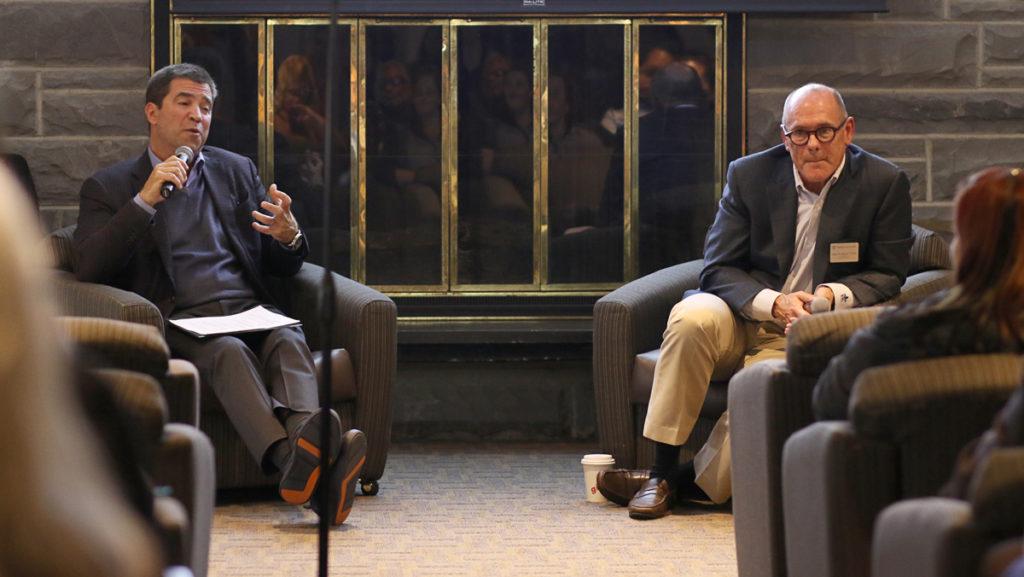The Ithaca College Board of Trustees approved the 2020–21 fiscal budget, a decrease from the 2019–20 fiscal budget, after delaying approval due to the impacts of the COVID-19 pandemic.
President Shirley M. Collado and Dave Lissy ’87, chair of the board, announced the news to the college community via email June 26. The board usually approves the fiscal budget during its annual May meeting, which took place this year from May 14 to 15. The college moved its admissions deadline to June 1, so the board and the senior leadership team decided to delay the budget approval until they knew how many students are enrolled at the college.
The board approved a $189 million net revenue operating budget for the 2020–21 fiscal year, which is a $28 million decrease from the forecasted amount for the previous fiscal year, the email stated. This is the second year in a row that the college has reduced its budget. Last year, the 2019–20 fiscal budget had to be changed after the college did not meet its target enrollment for the 2019–20 academic year.
This decrease in the budget reflects the decrease in enrollment, the email stated. Laurie Koehler, vice president for marketing and enrollment strategy, shared an update on the college’s enrollment June 18. The yield rate, which is the percentage of accepted students who enrolled at the college, for the 2020–21 academic year is down 3.5%, and the freshman enrollment rate is down more than 20%, the message stated.
For the 2019–20 academic year, the college’s acceptance rate reached its highest percentage since 2009. The college admitted 10,326 applicants, and 1,506 applicants enrolled, making the yield rate 14.6%. This was the lowest yield rate since 2014, when it was 14.5%.
There are currently 1,155 students who have made deposits to the college, but after melt — when students enroll but later cancel their enrollment — Koehler anticipates that there will be approximately 1,100 students in the Class of 2024, the message stated.
According to the 2019–20 Facts in Brief, 1,506 freshmen enrolled at the college in Fall 2019. The 2018–19 Facts in Brief states that 1,666 freshmen enrolled in Fall 2018. The 2017–18 Facts in Brief states that 1,622 freshmen enrolled in Fall 2017.
Koehler said in an interview that this decrease in enrollment is an issue that not only the college is facing but that many colleges in the Northeast are facing.
“I was concerned because something we’re doing at the college as a whole isn’t resonating, isn’t working,” she said. “We’ve seen applications decline for two years in a row, and a lot of schools are experiencing that.”
Collado and Lissy stated in the June 26 email that this decrease in enrollment will have a long-term impact on the college.
“We’d been anticipating this decrease in enrollment and it will have budget implications, not just this year, but in every future year the 2020 cohort of students is enrolled at IC,” Collado and Lissy stated in the email.
The 2020–21 fiscal budget is dedicating $127 million to unfunded institutional financial aid. Unfunded institutional financial aid does not include restricted financial aid, government funds or donations, the email stated. The board approved a $7.7 million capital budget for the 2020–21 fiscal year, which is a decrease from the 2019–20 capital budget of $15 million, the email stated.
The email stated the college is investing in information technology equipment to aid in teaching and learning, resources for the Physician’s Assistant Program and deferred maintenance, which is postponing maintenance activities like repairs on property. The college will focus on projects that have to do with health and safety, so the campus community can return in the fall, the email stated.
The college has been making budget cuts in this area, with its surplus budget for the 2018–19 academic year having decreased by $15 million, leaving fewer funds for deferred maintenance, the endowment and other campus repairs. The college also made budget cuts during the 2019–20 fiscal year because of lower projected enrollment.
The senior leadership team also provided updates to the board about enrollment strategy, the collaborative work around the 2020–21 academic calendar and the work the Return to Campus Task Force has been doing, the email stated.
The next board meeting is scheduled to take place Oct. 21–23 on the college campus.








